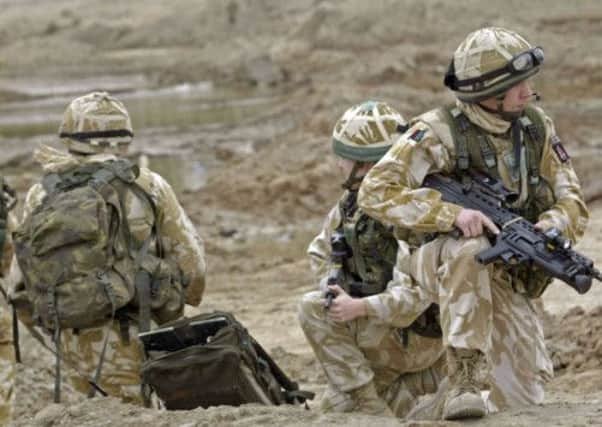Comrades fought to stop soldier dying of heatstroke


Private Jason Smith fell ill when temperatures soared to more than 40 degrees in the south-east of the country. The 32-year-old was taken by ambulance to a British medical base but died at Camp Abu Naji, Al Amarah, on 13 August, 2003.
“There was blood coming from his mouth. I looked in his airways and I saw blood,” said Sergeant Bernard Doolan, a medical technician who was first to treat Pte Smith, after he was found at the foot of a staircase by another soldier.
Advertisement
Hide AdAdvertisement
Hide AdSgt Doolan told the inquest into Pte Smith’s death that the reservist’s temperature was “very, very” high, but he was not sweating – indicating the latter stages of heat-related illness.
“Pte Smith was declining very rapidly. I sent a person to the operations room to get the ambulance for him,” said Sgt Doolan.
“A corporal turned up with a stretcher. We managed to get him downstairs into the back of an ambulance.
“We were dabbing him down with water and started to take his clothes off and pouring water all over him.”
The inquest at Oxford Coroner’s Court was the second into Pte Smith’s death, after an order by the Supreme Court.
The initial hearing in November 2006 ruled that the soldier from Hawick would not have died if the British Army had followed correct procedures.
It found his death was caused by a “serious failure” after his difficulties acclimatising to the high temperatures of Iraq had not been recognised.
Pte Smith’s mother Catherine then launched a campaign calling for human rights legislation to be applied to British troops in combat, leading to the Supreme Court ordering another inquest to take place, following judicial review proceedings.
Advertisement
Hide AdAdvertisement
Hide AdThe first battalion the Scottish Borderers were based at a stadium known as Al Amarah – once a building designed for Saddam Hussein rallies.
C Company of the Scottish Borderers had about 100 men based at the stadium at the time of the tragedy.
One of Pte Smith’s comrades, Sgt Joseph Holmes, described the stadium as a “dusty, overheated, hot hellhole”.
Sgt Robert Patterson, who had been the company medic at the time of Pte Smith’s death said yesterday that the soldier had been to see him to complain of the effect of the heat four days before his death.
Pte Smith was hooked up to a “Pro Pack” machine and exhibited a normal pulse rate and temperature.
Sgt Patterson said he had advised Pte Smith to take 24 hours of rest, and avoid wearing too many layers of clothing.
“Any advice would be the flip-flop order – strip yourself to shorts and T-shirts, flip flops, keep yourself hydrated,” he said.
Sgt Patterson said that when he saw Pte Smith the following day, the soldier had told him “it was all good”.
Advertisement
Hide AdAdvertisement
Hide Ad“There were no areas of expressed concern,” Sgt Patterson added.
Sgt Patterson said that many troops arriving in Iraq had been affected by the heat, and he admitted he had been unprepared for the number needing treatment on his arrival at the larger Eagle Camp in Kuwait.
“Within the first 72 hours, we saw 400 patients – this was at Eagle Camp just before the deployment to Al Amarah,” he said. “There were quite a lot of complaints.”